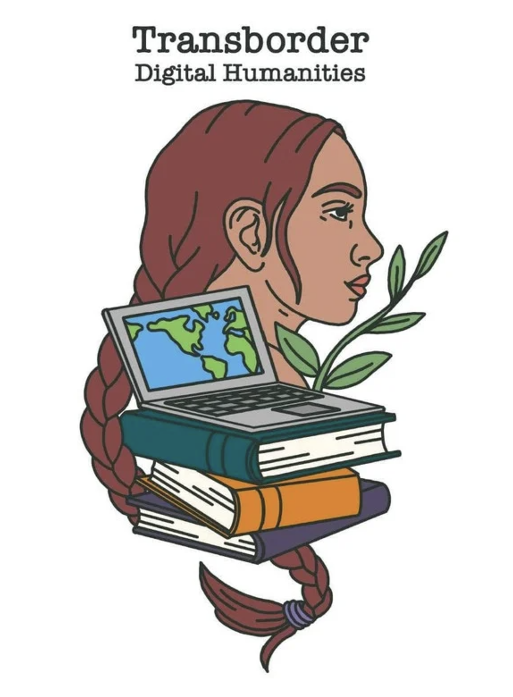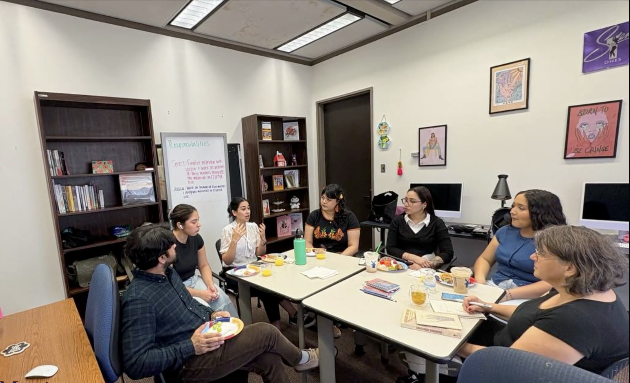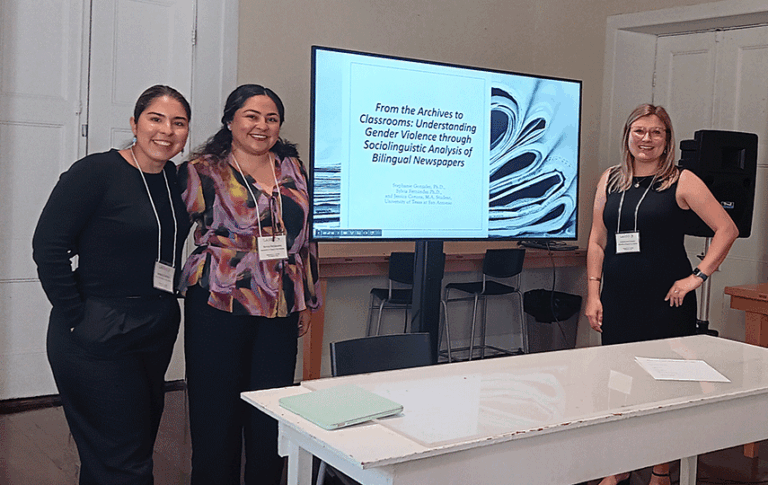Celebrating a Year (2024-2025) of Growth and Impact at TransBorder Digital Humanities (TBDH)
From launching our initiative to winning awards, hosting international speakers, planning a center and a consortium, forming a community of student fellows, faculty and library professionals and strengthening partnerships across borders, 2024–2025 was a breakthrough year for Transborder Digital Humanities (TBDH). We expanded our reach, amplified borderlands voices, and brought together scholars, students, and communities across the Americas to imagine new ways of telling transborder stories. Every speaker series, work session, workshop, and collaboration pushed us closer to our mission: fostering transborder thinking through ethical, responsible and community-centered digital knowledge production.

With the support of the Mellon Foundation and the College of Liberal and Fine Arts at the University of Texas at San Antonio, in February 2025, we officially launched our initiative to start planning the establishment of a center and consortium dedicated to TransBorder Digital Humanities. And, to top it off, TBDH unveiled the La Transfronteriza logo created by El Paso border artist Christin Apodaca, and crafted swag by Creative Designs in Eagle Pass, Texas.
That same month, we launched the TBDH Speaker Series, hosting the first talk “The Border Work: Episodes of Demarcation, Passages, and Representations” with international transborder scholar, Dr. Adriana Dorfman from the Federal University of Rio Grande, Brazil, who shared her work on border studies in South America with our community (presentation available on our YouTube Channel). Our next Speaker Series talks in Fall 2025 will feature Dr. Kristen Mapes and Dr. James Yeku, who will be sharing their insights working across borders through Global Digital Humanities and African Digital Humanities.
During the summer, TBDH had two collaborative sessions with graduate fellows, Co-PIs, and guest facilitator Dr. Katie Knowles, Postdoctoral Fellow at the University of Kansas, who provided guidance on digital humanities research directions. Building on this collaborative foundation, TBDH team brainstormed a proposed research/teaching/community project tied to their diverse expertise that reflects the interdisciplinary and transborder scope of our work. Each Co-PI contributes a specialized focus that strengthens our collective vision:
- Dr. Sylvia Fernández, TBDH PI, Interdisciplinary School of Engagement at the University of Texas at San Antonio, develops counter-archives of border culture, curates feminist data on transborder social movements, and builds digital cartographies of women’s geographies in literature and testimonio.
- Dr. Carolina Alonso, TBDH Co-PI, Border and Languages at Fort Lewis College, develops podcasts and social media content on sports, highlighting female and LGBTQ+ roles in soccer in the U.S.-Mexico borderlands.
- Dr. Maira Álvarez, TBDH Co-PI, Critical Digital Humanities Center at the University of Toronto, documents militarization and surveillance in the border region through a range of archival and humanities sources.
- Dr. Laura Gonzáles, TBDH Co-PI, English Department at the University of Florida, explores artificial intelligence tools for translating and interpreting Indigenous languages within the border legal system.
- Dr. Stephanie Brock Gonzáles, TBDH Co-PI, Spanish as a Heritage Language Program at the University of Texas at San Antonio, advances digital pedagogy of border heritage Spanish and develops a linguistic corpus focusing on no sabo kids in the South Texas border region.
- Dr. Sylvia Mendoza, TBDH Co-PI, Race, Ethnic, and Gender Studies at the University of Texas at San Antonio, engages in oral histories methodologies of local border and Mexican-American music culture, connecting them to broader civil rights movements.
- Brian Rosenblum, TBDH Co-PI, University of Kansas Libraries, works with archives and libraries, overseeing copyright and agreements connected to digital production across borders.
Beyond the collective expertise of our Co-PIs, TBDH at UTSA has also been a space of growth and accomplishment. This spring, we celebrated key milestones on campus. In April, graduate fellows from the Spanish Master’s program—Jessica Corona, Elisa Castro, and Emily Rodriguez from UTSA, represented TBDH at the 10th Annual Global DH Symposium at Michigan State University, engaging in conversations focused on transborder topics as well as meeting scholars from various institutions. TBDH graduate fellows, Jessica Corona, Elisa Castro & Emily Rodriguez, also presented their digital projects as part of their graduate thesis at the UTSA COLFA Conference where they received recognition for their innovative and social justice oriented research.
This year TBDH celebrated the individual and collective achievements of the UTSA group. We are very grateful for everyone that has been supporting them:
- Jessica Corona, TBDH graduate fellow, earned her M.A. in Spanish and now continues as a Post-Master’s Fellow. She completed a hybrid thesis titled “Gender-Based Violence in the Latin Press (19th–20th C.)”, a feminist digital database that documents how violence against women was reported—and often silenced—in Spanish-language newspapers along the border. Both her thesis and database are now part of our TBDH research resources. As a Post-Master’s Fellow, Jessica supports events coordination and assists in digital research and curriculum development. She is currently receiving guidance and mentorship in preparing for doctoral program applications.
- Dr. Sylvia Fernández directed Corona’s thesis and has been advising and mentoring her in her career as a transborder digital humanist focused on gender violence data in archival sources. Dr. Maira Alvarez and Dr. Carolina Alonso provided feedback and guidance to Jessica Corona in her hybrid thesis project, helping to strengthen her work.
- Cristina Ortiz, TBDH undergraduate fellow, completed her B.A. and stepped into a TBDH graduate fellowship supporting her to complete her Master’s in Spanish with a focus in Transborder Digital Humanities.
- Emily Rodriguez and Elisa Castro, TBDH graduate fellows, advanced their digital projects through mentorship and guidance resulting in well-deserved recognition within their institution and in public events. They will both graduate in Fall 2025 under the direction of Dr. Fernández, with additional support and feedback from TBDH Co-PIs.
- TBDH PI and fellows at UTSA have been working on the project Fuerza Feminista: Intimate Recovery Memory Archives (FFIRMA) that will be completed and launched in Fall 2025. FFIRMA is a transborder digital humanities project in collaboration with New Mexico State University faculty and students, and human rights organizations, dedicated to documenting and preserving the legacy of the movement against feminicide and gender-based violence along the U.S.-Mexico border, with a particular focus on Ciudad Juárez, Chihuahua, and neighboring U.S. cities.This cross-institutional oral history project, soon to be presented to the public, exemplifies TBDH’s mission to center border voices, preserve collective memory, and build bridges between scholarship and activism.
A key milestone for the first quarter of 2025 was the growing partnership with the Digital Humanities Student Organization (DHSO) at UTSA led by doctoral student Niloufar Esmaeilli with the support of the Responsible Computing Challenge of the Mozilla Foundation. This has fostered transdisciplinary research in transnational and transborder digital humanities and cross-cohort mentorship. In collaboration with the DHSO, we hosted Professor Catherine D’Ignazio for a virtual workshop on Data Feminism and Counter Data Science. Participants explored feminist approaches to data, care, and equitable practices, inspired by her groundbreaking works Data Feminism and Counting Feminicide.
Dr. Sylvia Fernández delivered keynotes and panel presentations at the UTAH DH Symposium, Data Advocacy for All, Institute of Digital Research in the Humanities Lecture Series at the University of Kansas, IV Congreso Internacional de la Asociación de Argentina de HD, and Global DH Symposium. She also led the keynote and workshop at the 2025 Digital Borderlands Institute at the University of Arizona Libraries, sharing powerful insights on transborder storytelling and pedagogy. These invitations show how TBDH is being highly recognized, highlighting how transborder research, pedagogy and community building in these areas can have an impact in and out of academia.
From start to finish, this year has been one of action, collaboration, and impact—and we’re only just beginning. Our mission thrives through collective effort and commitment to a better world, and we are deeply grateful to the College of Liberal and Fine Arts at the University of Texas at San Antonio, the Mellon Foundation, the TBDH team, and Coneflower Consulting for their unwavering support in bringing this work to life. If interested in TBDH events and community follow us on social media to stay up to date on everything we will be doing!

